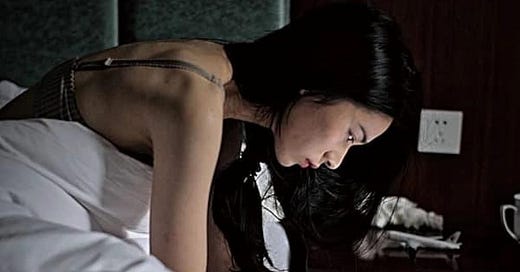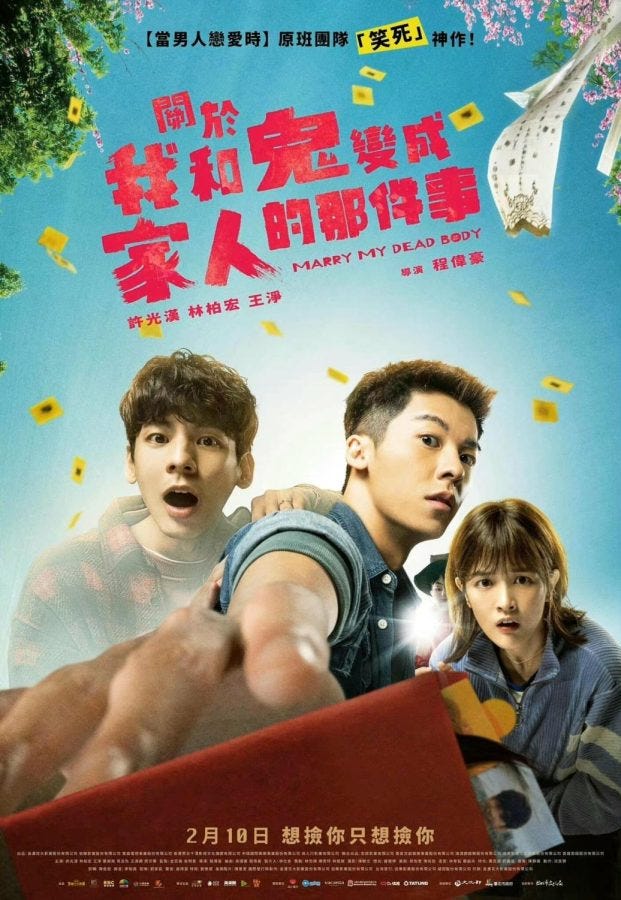Like much in modern Taiwan, the Golden Horse Film Festival and its accompanying awards (widely considered the Oscars of the Chinese-speaking world) have recently been shaded by Beijing’s sovereignty claims over the island. Mainland China announced a boycott of the Golden Horse Awards in 2018, and have dissuaded Mainland filmmakers and artists from participating ever since. Accordingly, now only Chinese-language films from within the PRC compete in Beijing’s equivalent Golden Rooster Awards, and all from outside still vie for Golden Horses in Taipei. This, of course, has had adverse consequences—five out of six films nominated for Best Feature in the 2021 Golden Roosters were “tributes” to the 100th anniversary of the Communist Party. Hmm. Yeah, even some CCP supporters openly wondered if this signaled a lack of, um, quality cinema left for consideration.
I’ve had the privilege of seeing many of this year’s award winners, though a few have still escaped me. We’ve previously reviewed the winner of Best Documentary Feature (Youth (Spring) by Wang Bing) in our 2023 Cannes coverage, but here are some of my other highlights—for those of us less familiar with the sinophonic box office.
Marry My Dead Body
Directed by Cheng Wei-hao
Languages: Mandarin, Hokkien (Local title: 關於我和鬼變成家人的那件事1)
Shaun’s Score: 2.4/5 ★
Certainly the most entertaining flick of the 2023 Taiwanese festival docket, Marry My Dead Body is Taiwan’s submission for Best International Feature Film at the U.S. Academy Awards. Starring “national husband”2 Greg Hsu and previous Golden Horse-winner Austin Lin, Marry My Dead Body is an action comedy about a superstitious and homophobic3 policeman who inadvertently marries (through a traditional “ghost marriage”) a gay ghost. In their posthumous matrimony, the newlyweds endeavor to crack the cold-case murder mystery of the deceased’s killer. A straight guy solving crimes—it’s like an inverse George Santos.
Marry My Dead Body is one of Netflix’s most popular Chinese-language films of 2023 and has had an outsized cultural impact on queer culture, so much so that my coworkers actually sponsored a “discussion session” about the film before Taipei Pride. But despite nabbing 8 Golden Horse nominations, the film only escaped with Best Adapted Screenplay—just 1 win, Boo-hoo Netflix.4 Look, it’s funny and lighthearted, but it’s also disgustingly sappy and cliché. The film falls into the same trap that still haunts most recent Taiwanese blockbusters—an abundance of side quests. You can lead a Golden Horse to water, but you evidently can’t make it focus on the main idea.
Day Off
Directed by Fu Tien Yu
Languages: Mandarin, Hokkien (Local title: 本日公休)
Shaun’s Score: 2.9/5 ★
Okay fine, I did shed a tear while watching this on a Cathay Pacific flight. Fu Tien Yu’s Golden Horse Winner for Best Original Song and Best Supporting Actress is a family drama about a mother whose barbershop has been a staple in the community for over four decades. When a distant client requests a special visit, our hairdressing heroine closes shop for the day and ventures to find him. The film has a compelling emotional centerpiece, surrounded by a deceptively bland storyboard—think à la when Kaley Cuoco was surrounded by those deceptively bland bangs. I’d commend the acting while also lamenting the lack of bigger concept: the film begins to unpack the transience of human connection within a service career, but stops short, with a few flyaway hairs still out of place. Ultimately, Day Off snips off a few too many inches (slice of life indeed).
Eye of the Storm
Directed by Lin Chun-Yang
Language: Mandarin (Local title: 疫起)
Shaun’s Score: 2.8/5 ★
While I’d first assumed this film would be about COVID-19, Eye of the Storm is actually a historical drama about a Taipei City Hospital branch caught on the frontlines of the 2003 SARS outbreak.5 Claiming Best Visual Effects and Best Art Direction, Eye of the Storm was also nominated for but passed over by other categories including Editing, Sound, and Leading Actor. Many of the characters’ struggles resonate with 2020’s pandemic ethos—healthcare workers pushed to the brink, teams overwhelmed and understaffed, and a system wholly unequipped to handle the immense obstacles accompanying a novel pandemic.
While the story is brimming with the humanity of healthcare professionals (their fear, their bravery, their love for boxed lunches), it also seems to have skipped the cliché vaccine. Too much energy is spent on developing stories quarantined from the main plot, family squabbles and scattered relationship drama—a more concentrated variant of the virus that sucked the air out of Steven Soderbergh’s Contagion (2011). Pandemics are unique, collective traumas that can’t be easily compartmentalized into the recesses of memory, and Eye of the Storm is evidence that Taiwan (among other places) still hasn’t fully processed the turmoil of SARS (much less COVID-19). I look cautiously towards the decades of pandemic-era cinema ahead of us (some, like Asteroid City and Bad Luck Banging or Looney Porn have already been innately influenced), but for now, I’m still sick of cramped screenplays.
Abang Adik
Directed by Lay Jin Ong
Languages: Mandarin, Cantonese, English, Malay, Malaysian Sign Language (Local title: 富都青年)
Shaun’s Score: 3.5/5 ★
This Malaysian big-ticket heartstring-tugger proved sufficient to beat Marry My Dead Body to Best Leading Actor, with star Wu Kang-ren6 edging out both Greg Hsu and Austin Lin for the title. The film chronicles the struggles of brothers Abang (Wu) and Adik (Jack Tan) navigating not having Identity Cards in Kuala Lumpur while being deaf and an incorrigible troublemaker (respectively). Abang Adik painstakingly illustrates the intersection of insecure immigration status and poverty, a challenge not exclusive to the region but amplified by Malaysia’s unique linguistic diversity and backsliding democratic institutions. One poignant exchange translates roughly as “We put these assholes in power, then they funnel resources into immigration raids, I’m so voting them out next time” / “Dude, you can’t vote.”
The film has strong technicals and a compelling series of twists that strengthen the core message instead of diluting it. Unfortunately, the studio isn’t at a place financially where they can afford to make films that aren’t easy to understand, and much nuance is lost in the clarity of the processional. I can’t fault Malaysian cinema for still developing, but I look forward to when directors like Ong can sell tickets without pulling the audience by the hand through the plot. Still, I guess one shouldn’t look a Golden Horse in the mouth.
Stonewalling
Directed by Huang Ji, Ryuji Otsuka
Languages: Mandarin, Xiang, English (Local title: 石门)
Shaun’s Score: 4.1/5 ★
Finally, the Best Narrative Feature7 winner. 20-year-old Lynn (Yao Honggui) lives with her boyfriend Zhang (Liu Long) in Changsha, the capital of China’s Hunan province. They study English (though Lynn is still a fledgling beginner) while working odd jobs to make ends meet—Zhang DJs and emcees events, Lynn dons a princess tiara outside a jewelry store, etc. They have dreams of pushing beyond their bubble, as Lynn studies to become a flight attendant and the couple floats living abroad, but the future is thrown into question when Lynn follows a strange job tip down a dark path, and in the process, discovers that she’s pregnant.
Stonewalling is an excoriation of the Chinese gig economy. Much like Youth (Spring), the film shines a light on a generation caught between tradition and modernity, between poverty and prosperity, between promises of development and a grim, Kafkaesque reality. Lynn struggles due to not just her own naïveté, but also her partner’s intransigence, her parents’ recklessness, and her community’s transactional paradigm. Perhaps Beijing’s resistance of the festival is about more than just audience preservation after all.
My personal English translation: “About That Thing Where I Married a Ghost…”
Many translations of this in Western media prefer to say “muscular,” which is a tad baffling and incredibly wrong. One of his first lines is (my personal translation), “all you people know how to do is hookup and do drugs.” Yeah, he has a redemption arc, but let’s be real.
My lame attempt at a ghost pun.
For my American readers, SARS was the COVID before COVID was cool (i.e. ~20 years ago in Asia).
Already a well-known actor, previously winning two of Taiwan’s Emmy equivalent (Golden Bell Awards).
The Golden Horse equivalent of Best Picture.











